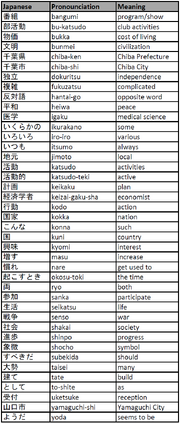Society is the 74th skill (assuming read left to right) in the Japanese language course. It has 6 lessons.
Grammar Notes[]
Summarize, but do not quote, any grammar notes provided with this skill. Notes from Duolingo are copyrighted, and cannot be added here verbatim without permission. Make sure to reference any tips and notes from Duolingo or anywhere else.
Use of -そう[]
-そう means "apparently". Attached to -い adjectives, it replaces -い when doing so:
面白い (interesting) → 面白そう (apparently interesting)
Lessons[]
Lesson 1[]

Duolingo Society
- 天皇 (ten-nō) = emperor
- 象徴 (shō-chō) = symbol
- 国家 (ko-kka) = nation
- 平和 (hei-wa) = peace
- ...を大切にすべきだ (...wo-tai-se-tsu-ni-su-be-ki-da) = you should value ...
- [国家間, 両国家, 平和的]
Lesson 2[]
- 建てました (ta-te-ma-shi-ta) = I built
- 世界 (se-kai) = world
- 世界中 (se-kai-jū) = around the world
- 社会 (sha-kai) = society
- 社会の窓 (sha-kai-no-mado) = trousers' zipper ("the society's window" ¯\_(ツ)_/¯)
- 文化 (bun-ka) = culture
Lesson 3[]
- 戦争 (sen-sō) = war
- 経済 (kē-zai) = Economics
- 経済学者 (kē-zai-gaku-sha) = economist (‘economics student’)
- 行動 (kō-dō) = behaviour/person's actions
- 行動を起こすとき (kō-dō-wo-o-ko-su-to-ki) = the time to take actions
- 反対語 (han-tai-go) = antonym
- 経済的 (kē-zai-te-ki) = economically
Lesson 4[]
- 生活 (sē-ka-tsu) = lifestyle
- 番組 (ban-gu-mi) = TV show
- 面白そう (o-mo-shi-ro-sō) = seems interesting
- 活動する (ka-tsu-dō-su-ru) = to be active
- 部活動 (bu-ka-tsu-dō) = club activity
- 活動的な人 (ka-tsu-dō-te-ki-na-hi-to) = an active person
- 慣れています (na-re-te-i-ma-su) = I am used to
- 話すこと (ha-na-su-ko-to) = speech
Lesson 5[]
- 山口 (ya-ma-gu-chi) = Yamaguchi (a city name)
- 千葉 (chi-ba) = Chiba (a city name)
- 市 (shi) = city
- 県 (ken) = prefecture
- 独立していない (do-ku-ri-tsu-shi-te-i-nai) = be not independent
- 進歩 (shin-po) = the progress
- 進歩した (shin-po-shi-ta) = I made progress
- 文明 (bun-mē) = civilisation
- [進歩的]
Lesson 6[]
- 計画しています (kē-ka-ku-shi-te-i-ma-su) = I am planning
- 受付 (u-ke-tsu-ke) = reception
- 地元 (ji-mo-to) = local
- 物価 (bu-kka) = the cost of living
- AとしてB (A-to-shi-te-B) = B as/as the role of A (more like "A being played by B")
References[]
